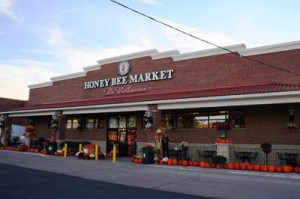Another Urban Myth?
Renaissance in Detroit Challenges ‘Food Desert’ Perception
by Jay Walljasper
In many people’s minds, Detroit stands apart from other major American cities as an unredeemable disaster.
 It’s a lost cause, they say, and we’d do better investing scarce resources toward revitalizing other cities with better prospects for the future.
It’s a lost cause, they say, and we’d do better investing scarce resources toward revitalizing other cities with better prospects for the future.
So what makes Detroit different in the public imagination than other cities grappling with population loss, budget deficits, unemployment, crime, racial divisions and political corruption?
In large part, it’s disinformation. For example, the widespread belief that the city is a food desert with no supermarkets or any sources of fresh produce is, like many myths about Detroit that have grown up over the past 30 years, simply not true.
Actually Detroit sports more than 80 groceries, ranging from full service supermarkets to well-stocked neighborhood and ethnic stores. In May, Whole Foods broke ground for a new store in Midtown and Meijer’s, a well-regarded supermarket chain based in Grand Rapids, started construction on a superstore on the West Side.
Most Detroit supermarkets are family run, such as the beloved Honeybee La Colmena in Southwest Detroit, which grew up from a bodega and now features a produce section, meat counter and Latin foods selection to rival big box retailers. Co-owner Tammy Alfaro-Koehler, granddaughter of the founder, declares: “We are a full-service store, but we don’t want to be an anonymous big store. We’re part of the neighborhood.â€
Tens of thousands of local residents do their weekly shopping at Eastern Market, one of the nation’s largest public markets, which features produce and prepared goods from 250 regional growers and vendors as well as surrounding blocks filled with a bakery, meat market, seafood store, specialty gourmet shops, America’s “oldest corned beef specialist,†an halal slaughterhouse, numerous restaurants and other tempting food related businesses.
“We have some vendors who have been here for generations, like one old farmer who remembers selling produce here with his grandfather when he was six,†says Jela Ellefson, Grants and Special Projects Coordinator, who joined Eastern Market through the Detroit Revitalization Fellow Project — a Wayne State University project that connects rising professionals with organizations on the forefront of revitalization efforts in the city.
Detroit is a blossoming leader in the urban agriculture movement, notes Ellefson, with more than 1500 farms within the city limits ranging from vacant lots to a 7-acre spread on the West Side planted by the Detroit Black Community Food Security Network. Just two blocks from Eastern Market you’ll find neat rows of tomatoes, peas, salad greens, onions, beets, collards, okra, kale, leeks, rhubarb and fruit trees at the 2 1/2-acre Grown in Detroit cooperative farm, one of several plots around the city run by the group Greening of Detroit.
All of this certainly defies Detroit’s reputation as a food desert. Oran Hesterman, president of the national Fair Food Network, notes that the definition of a food desert is a place without mega-scaled groceries. “If you define the problem as the lack of these kinds of stores, then they represent the only solution. But there are many different ways to provide fresh foods in a city.â€
His group, which is based in Ann Arbor but works across the country to “uphold the fundamental right to healthy, fresh and sustainably grown foodâ€, has launched three initiatives to improve Detroit’s food landscape, which he notes has three times fewer grocery stores per capita than Ann Arbor. 1) The Detroit Grocery Incubator Project, which helps local entrepreneurs launch groceries and other sources of wholesome food; 2) The Fair Food Fund, which channels capital to food entrepreneurs; and 3) Double-Up Food Bucks, a statewide initiative that offers food stamp families a 2-for-1 deal on Michigan-grown fruits and vegetables at farmers’ markets.
The Detroit Economic Growth Corporation, a non-profit business promotion organization that employs two Detroit Revitalization Fellows, initiated the Green Grocer Project (with funding from the Kresge Foundation), to help stores expand their fresh food offerings through assistance on loans, marketing, merchandising and customer service. The project also helped bring Whole Foods to town, and has launched an outdoor produce stand at the Metro Foodland supermarket in Northwest Detroit.
Additionally CDC (the Central Detroit Christian Community Development Corporation) runs a year-round indoor produce stand, Peaches and Greens, in the Central Woodward community, and a produce truck that travels to many low-income neighborhoods during the growing season.
“The food scene in Detroit is very grassroots, not just upper middle class people like in some places,†explains Wayne State Urban Studies professor Kami Pothukuchi.
She directs Seed Wayne — an initiative to promote fresh foods on campus with a weekly farmer’s market, community gardens, rooftop gardens and educational research — as well as Detroit Fresh, a project to bring healthier foods to corner stores throughout the city.
As we sat together at the Farmer’s Market — looking out more than a dozen vendors selling everything from vegetables grown on city farms to bread baked in the neighborhood to ice cream and cheesecake made from sweet potatoes — Pothukuchi says, “Our point is not to beat up people about what they eat, but to show what else is available. We want to connect people to the source of their foods.â€
Jay Walljasper is co-editor of On the Commons, and is the author of the book All That We Share: A Field Guide to the Commons (The New Press, 2010). He is a Contributing Editor at National Geographic Traveler, a Senior Fellow of the Project for Public Spaces, and a Contributing Author for New Clear Vision. This article originally appeared on Citiwire.net.
